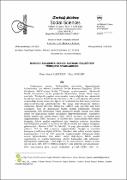THE ADAPTATION STUDY OF MATOVU ACADEMIC-SELF CONCEPT SCALE TO TURKISH
Abstract
This study aims to validate the academic self-concept scale by Matovu (2014) to test for its variability and reliability in measuring academic self-concept among university students in Turkey. The number of instruments for measuring academic self-concept in different populations is limited. The focus of the studies conducted in Turkey on academic self-concept have been on specific academic areas at primary and secondary education levels, rather than higher education level. In line with the aim of the study, the construct validity of the Turkish version of the Academic Self-Concept Scale (ASCS) was tested with a total of 400 university students. The data collected from 200 students were used for the exploratory factor analysis and the other data from the other half were used for the confirmatory factor analysis. Barlett Test and Kaiser-Meyer-Olkin (KMO) coefficient were used for the exploratory factor analysis, which suggested that the sample size was sufficient for factor analysis and that the data was suitable for factor analysis. ASCS was found to have two factors, with factor loads ranging from .722 to .963. The internal consistency (coefficient alpha) of the scale was calculated as 0.93. The total item correlations varied from .43 to 0.80. Next, the confirmatory factor analysis was done to obtain standardized coefficient estimates, which were examined by t test for the significance of the coefficients. Chi-square, GFI, CFI and RMSEA values were obtained for the interpretation of model fit. DFA results showed the fit indices were 2 / 2.04 sd , GFI= .91, CFI=.90 and RMSEA=0.051. Consequently, it is established that the Turkish version of the scale is a valid and reliable tool for measuring academic self-concept among Turkish university populations.
Collections
- Research Papers [35]

